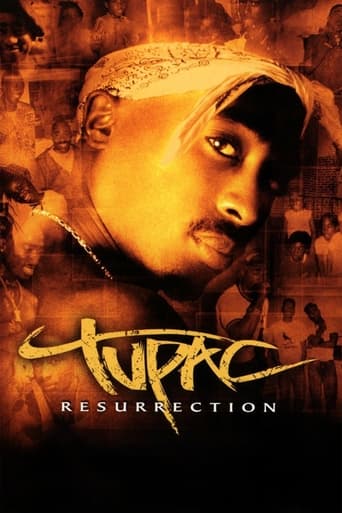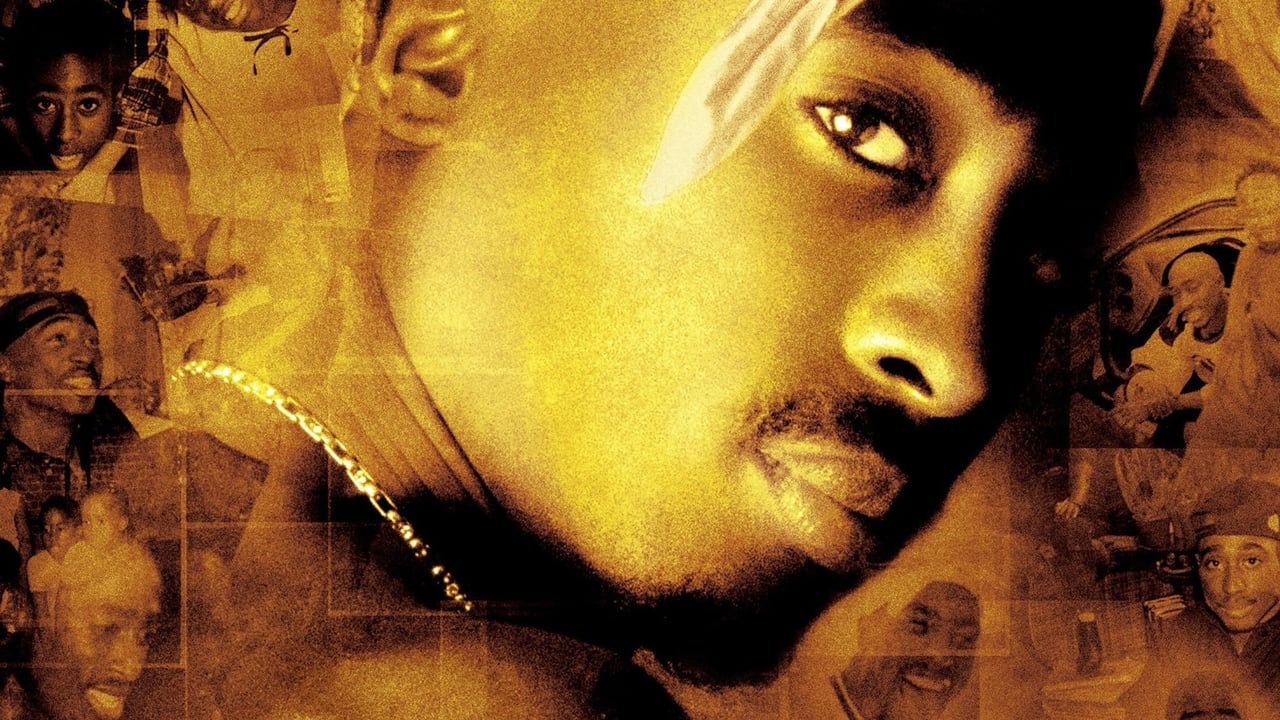Steve Pulaski
Tupac: Resurrection is made such a compelling documentary because rather than a documentarian detail the life, motives, and opinions of the late rap icon Tupac Shakur, old interview compilations, poetry excerpts, excerpts taken from Shakur's colorful music, and much more are played in order for him to tell his own life story despite no longer being with us. This provides for one of the most personal documentaries I have yet to see, especially considering that it would've been much easier to hire a narrator to analyze Shakur's upbringing, rise to fame, untold controversy, and his untimely death in 1996.When Shakur died, he left us with a plethora of content, some of which had been released, some of which would later see a release on his label Death Row Records. Tupac: Resurrection even contains some seldom-heard music from the man himself, and even emphasizes on Shakur's handwritten poetry, which describes his mother, who was a devoted Black Panther, and his father - whom he didn't know until later in his life - who was also an activist for African-Americans. Growing up in an unstable home, where violence was prominent and alternate living conditions were difficult to arrange, Shakur would often emulate the behavior of characters on sitcoms like Different Strokes, which revolved around a big, happy family - something Shakur craved.Shakur had the fortunate circumstance of being exposed to the arts and the theater when we was very young, and read and admired William Shakespeare throughout his entire life. He recognized his good fortune by seeing others in his neighborhood not even know who he was talking about when he would try to hold a conversation with them on plays, art, theater, or what-have-you. After leaving his mom's house as a teenager, Shakur looked to role models on the streets, which helped build the Shakur we know today.The film shows Tupac as a commanding, rugged philosopher, who would always emphasize the word "thug" and his personal motto "thug life." However, the way he defined "thug" was much different than the contemporary dictionary definition of the world. Shakur states that a "thug," in his mind, is a prideful underdog - somebody who has nothing but still holds their head up and works to make something. "What's the difference between me saying, 'I don't give a f***?' and Patrick Henry saying, 'Give me liberty or give me death?,' Shakur asks.Directly after the scenes where Shakur is defining "thug" show Shakur working in efforts to bring the East Coast/West Coast sides of the rap game together in a social gathering that served as a truce in the nineties. Shakur stands tall on stage, rapping his heart out, before imploring the people at the gathering to stop the violence and he'll continue to organize benefit concerts as a token for his appreciation.When Shakur explains his music, however, is when he can be a deeply contradictory figure. Despite his music both equal parts powerful and empowering, Shakur's actual music and his explanations and analysis of his music frequently seemed to come at a crossroads. This isn't as big of an issue as it may seem. Shakur, despite being rugged, tough, and thuggish (the word is employed here with his definition in mind), he was also incredibly vulnerable, and his explanations of his work reflect a more sentimental or compassionate side of him that may or may not have been an afterthought. Regardless, even his perspective on certain issues makes one think more than the average rapper today. In one scene, Shakur tells us that the only reason the Vietnam War ended was because we saw the horror that took place over there; with other wars, we kind of just assumed people were dying in a beautiful, civil way When the time comes for Shakur's brief but significant career as an actor to be discussed, one can see that through his methods of preparation and focus when portraying another character that Shakur was nothing other than a method actor, or somebody that invests in and studies their character for an ample amount of time in order to perfect a role. From his memorably gritty performance as the main antagonist in the street-drama Juice to the sweeter, softer side of him shown in the film Poetic Justice, Shakur demonstrated a diverse, character-actor mentality despite being so young and impressionable in the industry.Finally, Tupac: Resurrection looks at the controversy Shakur endured, not in the form of concerned politicians and talking heads in terms of what music their children were listening to, but how Shakur found himself wrapped up in several sexual assault cases, all of which he vehemently denied. With the aura Shakur had created about himself through his music and ideas, he proved that while you can be one of the smartest thinkers in a dangerous industry, you're still part of a very dangerous industry, which only further proved true as Shakur was shot and killed in Las Vegas in September 1996 in a drive-by shooting.Tupac: Resurrection is a fantastic display of documentary filmmaking by director Lauren Lazin, who allows Shakur to discuss ideas and topics "in his own words," so the film's tagline goes, and provide us access to a great deal of exceptional content from the man himself. It is one of the strongest, most powerful music documentaries i have yet to see.Directed by Lauren Lazin.
sakatristan
I must say i thought it was very interesting to see this movie. I've only ever been a fan of 2Pac's music but have never taken my time to look at his life. As he said in the end of this movie "There is a Tupac in everyone" He did reach that spot in me. But I wonder if his killing will ever be solved. My guess is still Orlando Anderson. And now i really see what his contrubution has been to the world of music an discrimination. I wonder what have happened if his 3 albums where released while being alive. And if the rumors about Suge Knight had part in the plan of killing Tupac. But the next question about this man for me is would he still be famous in his world of music in the generation of music in 2006. One thing is a fact Tupac Shakur is a legend.
Peter Hayes
The life of the rapper/actor/sex criminal Tupac Shakur - told in his own (beyond the grave) words.The very word MTV sends shivers down my spin. The initials could be used as a by-word for superficial with its enthusiasm for everything that is popular (however dumb or irresponsible) and its sense that its audience cannot really concentrate for very long.Boy, they must they have been shaking in their fashion casuals over asking people to keep watching for 90 minutes! However, fear not. They haven't done too badly and it is only the close involvement of his ex Black Panther/ex drug addict mother (Afem Shakur) that prevents a fair and even picture.While the film lingers over minor matters (pratting around to the camera, etc.) no independent comment is allowed when things turn nasty. Which they often do.The involvement of Madonna in his life is glossed over (legal problems?) --- one of the long line of plastic "bad boys" that got her all hot-and-wet before falling for some strange religion and the English countryside. She didn't even visit him in jail -- so this film says -- ha, that is women for you!(No.1 in the Billboard charts in a high security cell - now that is something!)I love the way dumb people justify themselves. Stupidity -- rationalisation -- stupidity -- rationalisation - round and round like a merry go round. How many rounds of this has a bullet robbed us of? God knows. At least he had an agenda (which is to make as much money and have as much fun as possible) -- which is something his blank-eyed hangers on lacked.The film tries to fit in as much of his music -- and that of others -- it can get away wit, although it stops short (thankfully) of his full soft porn pop videos.I love music and I love pop history and while rap ranks near enough bottom of my own personal league table -- some of it is OK. Usually the stuff with the wit to steal/sample classic pop. Tupac predicted his own death -- so they say over and over again here. Rather like a guy that spend a lot of time in a brothel fanning himself with money predicts that sooner or later he is going to be lead away to get laid...
cantona_99_2000
Tupac Resurrection is a MUST SEE. Regardless if you know who Tupac is or not, this film gives a deep and interesting perspective on the life of Tupac. A TRULY GREAT Portrayal OF A LEGENDARY FIGURE. This documentary/film looks at how Tupac was brought up and how his life has changed many. It is all explained in Tupac's own words, which helps add to the feel of the film. In many ways the autobiography he never got to write, Tupac: Resurrection features the artist in his own words, examining his complicated life and the controversial decisions that plagued him while he was alive. Tupac: Resurrection captures, as never before, his boundless passion, searing honesty, and stunning intelligence, and showcases a range of never-before-seen writings, letters, screenplay ideas, lyrics, poems, photographs, and personal effects, and stands as an indelible testament to the artist's astonishing cultural legacy.


 AD
AD









